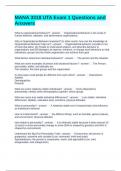MANA 3318 UTA Exam 1 Questions and
Answers
What is organizational behavior? - answer Organizational Behavior is the study of
human behavior, attitudes, and performance organizations
Why is Organizational Behavior important? (In other words, how can the knowledge of
Organizational Behavior help us?) - answer Organizational behavior: provides a set
of tools that allow: (A) People to understand analyze, and describe behavior in
organizations and (B) Managers to improve, enhance, or change work behaviors so that
individuals, groups and the whole organization can achieve their goal
What factors determine individual behaviors? - answer The person and the situation
What are some examples of person and situational factors? - answer The Person:
personality, ability, and attitudes etc.
The situation: the work groups and the organization
In what ways could people be different from each other? - answer Dispositions
Abilities
Demographics
Physical
What are some relatively stable individuals? - answer Some dispositions
(personality, needs) some demographics (gender, ethnic group)
What are some less stable individual differences? - answer Less stable: individual
differences: Abilities, education level, emotions, physical attitudes.
What is personality? - answer A relatively stable set of characteristics that influence
an individual's behavior
How is it determined? - answer By different things, such as heredity, genes (nature),
and environment, physical attitudes
How stable is personality? - answer It is relatively stable because it takes around 10-
15 years to show personality change in some (50% is shaped by genetics and 50% is
shaped by environment)
Understand the Big Five Personality Traits - answer Extraversion: the person is
gregarious, assertive and sociable (Low: resevered, timid and quiet)
Agreeableness: the person is cooperative, warm, and agreeable (Low: cold,
disagreeable, and antagonistic)
, Conscientiousness: the person is hardworking, organized, and dependable (Low: lazy,
disorganized, and unreliable)
Openness to Experience: the person is crative, curious, and cultured( Low: practical
with narrow interest)
Neuroticism: High: Nervous, self-doubting, moody --> Low: stable, confident
Understand the following differences: Locus of control, Self-monitoring, Self-esteem,
Type A and Type B - answer Locus of Control: an individual's generalized belief
about internal (self-control) vs. external control (control by the situation of by others) -->
External locus of control: describes people who believe that fate, luck, or outside forces
are responsible for what happens to them--> Internal locus of control: describes people
who believe that ability, effort, or their effort of their actions determines what happens to
them
Self-monitoring: the extent to which people base their behavior on cues from other
people and situations -- high self-monitors pay attention to what is appropriate in
particular situations and behave accordingly -- Low self-monitors: pay less attention to
situational cues and act more consistently with their internal beliefs and feelings
Self-esteem: an individual's general feeling of self-worth --> people with high self-esteen
feel capable, confident, worthy, perform better and are more satisfied with their jobs -->
low self-esteem: view themselves negatively are more strongly affected by what other
people think of them
Type A: have intense desire to achieve, are extremely competitive, have a sense of
urgency, are impatient, and can be hostile
Type B: these individuals are more relaxed and easygoing
What can we do to effectively manage employees with different personalities? Please
consult the two cases we discussed in class when thinking about this question - answer
- Acknowledge and appreciate
- Adjust your own feelings and actions to work effectively with others
- When feasible, structure an individual's work situation to fit his or her personality
- Remember that attitudes and behaviors are determined by the interaction of an
individual's personality and the situation in which the individual works. Encourage an
acceptance and appreciation of the diverse personalities in your organizations.
The power of personality: When is personality a powerful predictor of individual
behaviors? - answer A weak situation
What are strong situation? - answer a situation that overwhelms the effects of
individual personalities by providing strong cues for appropriate behavior
What are weak situations? - answer A situation where people have more free
choices in situations -- are open to many interpertations
What are some situations where worker's personalities will have a strong influence on
their behaviors? - answer Feeling stressed over an exam, hungry during a meeting




